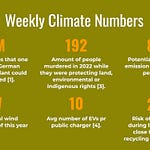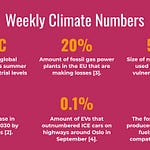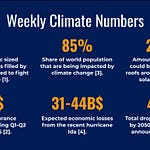Welcome to this weeks edition of The Weekly Climate 🎉
References: [1], [2], [3], [4], [5] and [6].
When writing this newsletter, one thing that continuously puzzles me is that it is so much easier to find climate news about the US than any other place. I always have to spend quite some time to make sure the newsletter is balanced and that it’s not too US-focussed. Most research, case-studies, policy and innovation news I find comes from the U.S. The US seems to have all the great climate reporters: Emily Atkin, Amy Westervelt, Mary Annaïse Hegglar, and many more. There’s a few here in the EU of course like Akshat Rathi but I must admit I find it odd that it is this difficult to figure out what’s happening on the climate front in other countries than the US. The US even have the best podcasts like The Interchange, The Energy Gang, How to save a planet, A matter of degrees, Generation Green New Deal, My Climate Journey and so on. I’m not subscribing to a single EU-based podcast (if you know any let me know). If I google “climate change news europe” the first two links that pops up are EU parliament sites. What are we doing over here? I wonder whether the fact that the US is such a divided society is what creates all these extremes. Just as a lot of the climate denial seems to come from players over there, there’s then a counter reaction of really high quality reporting on the real issues. Whereas here in the EU everything is pretty calm and quiet compared to the US so there’s no extremes in both ends. We’re more “complacent” in a sense because, “oh well things are going in the right direction, isn’t it?” Could that be the case?
The problem though is that the climate crisis is extreme. We have now less than a decade to halve our emissions. The current plan laid out by the EU gets us to around 35% (based on IPCC targets). This is an incredibly disturbing fact because it means that not even calm and quiet EU is compliant with the Paris agreement. This is much bigger news than any stupid pro-fossil fuel thing that Trump has done, because of course we know that he’s insane and doing everything he can to destroy our world. But the fact that calm and quiet EU is not even taking the lead on the Paris agreement is shocking. And it’s shocking that no major news media seems to catch on to this.
This is one of the visions I have for The Weekly Climate to do my part to find those local and global news items that are really important but for one reason or another doesn’t make it to the big media. I’m happy to report that I have seen quite an uptick in recent subscribers count: Almost a doubling in a month — that’s amazing. Thank you so much for subscribing and for keep on reading 🤗 Be sure to keep on sharing it with people you think would find it interesting. 🙏
‼️News you can’t miss
Trying a new way to segment this one by dividing news your can’t miss into different sections all symbolized by cat emojis of course: Here by giving you one scary/bad (🙀), good (😻), interesting (😼) and fossil (💩) news item.
🙀 Only 31 out of 190 countries have submitted more ambitious NDCs at the deadline of Dec 31 2020.
😻 Sale of EVs in Norway passed 66% in December 2020.
😼 Satellite look at how the climate crisis (and a few volcanoes) have changed the surface of the Earth.
💩 The Darth Vader of PR companies, FTI Consulting, are also behind the pro-hydrogen push in EU.
👩⚕️ Status: Climate & Science
Let’s look at how we’re doing this week!
[#warming] — Here are two articles about the same paper in Nature. It’s interesting to see the different headline. Time says: “Warming already baked in will blow past climate goals” and The Guardian says: “Global heating could stabilize if net zero emissions achieved”. Neither are false and both kind of click-baity but for different reasons: One positive, the other negartive. I know which one I like the most.
[#warming] — It has been determined that 2020 is the warmest year on record for Europe and a tie with the warmest year globally together with 2016. The map in the article shows the temperature differences between 2020 and the period 1981-2010.
[#earth] — This beautiful albeit scary pictures series from NASA satellites show the pictures of different areas before and after the climate crisis (and a few volcanoes) have transformed the surface.
[#wildfires] — Here’s a detailed look at the 2020 global wildfire season. And it’s not a very boring one. Unfortunately.
📰 The 7 Grand Challenges
⚡️Decarbonize Electricity
Clean electricity is the one do-or-die challenge we must solve.
[#solar] — Here’s an inspiring look at a community solar project. Community solar is solar for people who can’t install solar panels on their rooftops (for various reasons). Instead they can buy solar panels from a local solar power plant and in this way they get a credit off their utility bill (at least that’s how it works in the US).
[#solar] — New York Times dives deep in the solar installer business and reports that few installers are making money. The two biggest US one’s, although being very busy, reported losses of a combined 500M$ for the first 9months of 2020.
[#cities] — Grist dives into so called renewable cities, a city which is entirely powered by renewable energy. The starting point is cities in the US but the deep dive should be applicable to most of the world. Related, 🎧 The Interchange podcast looks at a recent paper by a Princeton professor that looks at 5 ways that the US can decarbonize.
🏘 Reduce impact of urban and rural areas
Lowering the impact of urban and rural areas.
[#ev] — Norways plug-in EV market is killing it (note plug-in EV means both full electric vehicles and plug-in hybrids). The market share for both in December hit 87.1% with a full 66% as full electric vehicles. It’s looking quite a lot differently in Germany — although the German market is also beating EV records in December it doesn’t look nearly as good as EV numbers are only 27% and only 14% of that is full EVs.
[#ev] — Denmark is notoriously known for it’s outrageous (although climate friendly) car taxes (180%). This Cleantechnica post looks at how complicated they really are — also for EVs.
[#rooftopsolar] — Reneweconomy takes a detailed look at rooftop solar and battery combination for solving the classic “duck curve” problem, i.e. the fact that people are not home using power during the day when solar power is generating at maximum, but get home and turns on all appliances at once.
🛁 Clean non-electrifiable activities
Some activities we do today can’t be electrified, these must be cleaned some other way.
[#plastic] — Grist answers a reader dilemma: “Which is worse, single-use plastic or long-haul shipping?” In this case, the reader wants to buy shampoo in the cleanest way possible and is considering using a refilling service (she lives in a rural area so her refilling bottle will have to be shipped back and forth) or just buying single-use plastic bottles of shampoo.
🌳 Protect and grow nature
Nature is our ally, we must protect it and help it help us.
[#trees] — Extinction Rebellion has launched a successful crowdfunding campaign in the UK to save at least 30.000 oak saplings from being burned after government support to plant them never arrived.
[#amazon] — A new paper reveals that the Amazon is heading for a tipping point in 2064 in which it is no longer able to sustain itself (e.g. when a drought occur every year, but the forest is spending four years to recover from one).
[#soil] — Ayana and Alex dives deep into the topic of soil and in particular from a climate justice perspective. Using soil properly for agriculture is the most promising technique to increase the Earth’s carbon sinks. 🎧Listen to this exciting episode where they interview the farmers who are actually doing it right.
🍽 Optimize food
Without the lower impact of food or drink the hero doesn’t work (modified old danish proverb).
[#meatless] — Some weeks ago we wrote about the company Eat Just first artificial meat product was approved for human consumption in Singapore. Grist looks at the first meal served with this new type of meat at a restaurant in Singapore. Eat Just chicken offering differentiates itself by the fact that it is real meat, but lab-grown i.e. no chickens were harmed in the making of it.
[#organic] — A new study has concluded that organic meat production is just as bad for the climate as conventional meat production. Some might call it bad news, but I must admit that I thought organic was worse for the climate because the feed used to feed the animals were made in organic hence lower yield farms. But there you go I learned something. The key here is that buying organic doesn’t mean you’re buying climate friendly.
⚖️ Climate Justice
Without justice there’s no future.
[#developingworld] — An article in The Guardian pushes the important agenda that it’s time to establish a World Carbon Bank — an organisation that provides aid and technology to help developing countries decarbonize. So far global developed world policies are very inward looking and are focussing mainly on the developed countries themselves.
[#activism] — Grist tells the inspiring story of how activists successfully shut down a key pipeline in New York. In these dark times it’s great to see that activism really works some time.
[#kenya] — In a report sent to the UN Kenya reports that it needs 67B$ to mitigate and adapt to the climate crisis in the next decade. That is 67% of it’s GDP 😳. This article dives into the woes of Kenya’s climate trouble.
📦 Other / catch-all
All the other stuff that I couldn’t fit into any of the other categories, than the other category.
[#NDC] — CarbonBrief and Climate Action Tracker looks at the NDCs submitted by countries by 2020 year end. And just to recap the previous submitted NDCs were targeting a 3C+ increase in global warming. So just about all countries needs to update and boost their NDCs in order to reach the 1.5C or 2C scenario as recommended by the IPCC. That was the purpose of the previous month’s Climate Ambition Summit to force countries to aim higher. So how many did? 31 out of 190.
[#banks] — Big US banks complain about a rule that a key regulator is proposing which would force them to do business with fossil fuel industry and gun companies — a group of clients that would subject the banks to public scorn.
⭐️Special Topics
🇺🇸 U.S. Presidential Election
We have a special interest in covering the U.S. Election as Bidens actions may or may not give the world hope in a world that’s starved for it.
We’re all in shock after what happened at the U.S. Capitol this week. Seriously, WTF. I don’t even know how to comment on stuff like this so I’m just going to continue with climate news from the U.S. Presidential Election.
[#arctic] — Trump’s sale of licenses to drill in the Arctic Wildlife Refuge looks like it has failed at least for now. Not a single fossil fuel company bid on the licenses. However, a state-owned agency did bid in order to ensure that it can offer the licenses in the future 🤨.
[#birds] — Trump just reversed series of bird protections which effectively will limit the liability of oil companies in case they kill birds via oil spills. The new regulation ensures that policymakers may not take science reporting on such impacts on birds into account.
⛽️Major Carbon Emitters
We have a special interest in covering the moving of the major carbon emitters as these are the key roadblock to climate action.
[#shippinggate] — New documents about the Mauritius “shipping-gate” oil spill reveal that BP is behind the highly toxic fuel VLSFO fuel which caused the ships (and many others) engine to fail.
[#propaganda] — A deeply head-scratching article appeared in the New York Times last week. It’s a portrait of young people who oh so badly want to work for the big oil industry but alas COVID (not climate change mind you) have put their future at risk. It smells like one big fossil fuel propaganda campaign all over that some how NYT fell for. Like the one I recently linked to with the women of the gas industry. Scary. Maybe the scariest of all is that this new one appears to be legit.
[#autodesk] —Heated reviews Autodesk fossil fuel problem — you know the way it talks about bold climate action while serving some of the biggest fossil fuel companies out there.
[#propaganda] — FTI Consulting (you know the PR company leading the attack for the fossil fuel industry on all media and politicians around the world) has been tied to the pro-hydrogen push in Europe. I literally don’t know what to think of this. It’s clear that green hydrogen could at some point in the future be a clean alternative for applications require a high energy density, but it’s also clear that right now it’s not. Green hydrogen is still expensive to produce and will in the very near future be made from methane — a fossil fuel industry product. So this looks like yet another attempt for the fossil fuel industry to stay in the burning game.
That’s it for this week folks! Remember if you’re feeling down, angry or sad from some of the news in this newsletter one cure is to act. And one way you can always act that also happens to be one of the most powerful things you can do is to talk about it. That also works if what you just read made you hopeful or happy btw.
If you enjoyed this newsletter don’t forget to share it with your friends, coworkers or other people you think could benefit from getting it. If you got directed here by a friend or another link on the Internet don’t forget to subscribe!
See you all next week 👋












